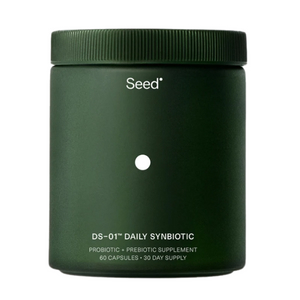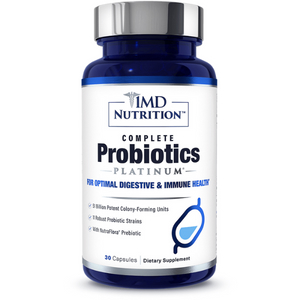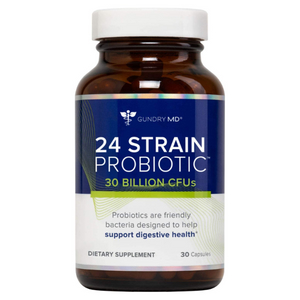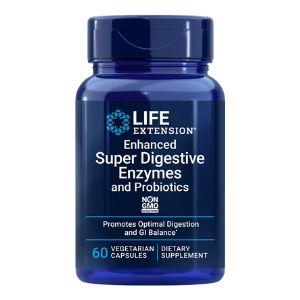Seed Probiotic Review 2024: Read Before Buying
All articles are produced independently. When you click our links for purchasing products, we earn an affiliate commission. Learn more about how we earn revenue by reading our advertise disclaimer.

8.8
Quality
8.4
Support Research
8.1
Reputation
7.5
Price
Features
- A high number of active probiotic strains
- Shelf-stable (no refrigeration required)
- Third-party tested
- Available in powder and capsule form
Brand Information
- Founded in 2017
- Launched officially in 2018
- Started by Ara Katz
- Based in Los Angeles
Medical Benefits
- Strengthens immune system
- Improves heart health
- Enhances dermatological health
- Promotes general health and wellness
About The Brand
Seed Health is a microbiome company run by a large ecosystem of entrepreneurs, innovators, doctors, and scientists from all over the world who produce next-generation, scientifically-proven probiotics. Seed’s mission is to provide the most effective probiotics with the much-needed efficacy, client education, and precision to meet the needs of the international probiotics market.
Seed Health was founded in 2017 by Ara Katz and Raja Dhir in Los Angeles and launched formally in 2018. It’s one of the most popular probiotics brands in the market today owing to its subscription method and the open evidence behind its science. Seed currently sells one product, the monthly pre/probiotic, otherwise known as the synbiotic.
What Is Seed Probiotic?
Seed Probiotic is an effective probiotic/prebiotic with an active formula that works to maintain a healthy digestive system and the gut microbiome. It helps in preventing and treating an imbalanced gut that may cause issues such as irritable bowel syndrome, skin conditions, high cholesterol, and various other health problems.
Keep reading this Seed Probiotics review to learn about its health benefits, ingredients, potential side effects, and a host of other well-researched information. Let’s dive into it, shall we?
Feature Product & Coupon

Seed Probiotic
- Safe to take during pregnancy
- Positive influence on cardiovascular and support skin health
- Tested for digestive survivability, potency, allergens, pesticide contamination, heavy metals, and microbial contamination
- Overly priced
- Cannot be taken by those under 18 years of age
Does Seed Probiotic Work?
Yes, it does! Seed has a whopping 24 strains of potent probiotics that are further classified into four groups: heart health, digestive health, micronutrients, and skin health. All these target a certain area of the gut and help to replenish the bacteria required to ensure a smooth digestive process.
Since bacteria are very small, it’s necessary for the probiotic to have the bacteria measured in billions. Every capsule of Seed Probiotic has 53.6 billion bacteria inside it. The number is measured in Active Fluorescent Units, or simply AFU.
What sets Seed apart from other probiotics is its inner capsule. It’s strong enough to get past the stomach acid, digestive enzymes, and bile salts and make its way through the digestive process to deliver all 24 bacterial strains in an intact and viable form.
Seed Probiotic Ingredients

Seed Probiotic is packed with a variety of potent blends. They include:
- Digestive Health/Gut Immunity/Gut Barrier Integrity Probiotic Blend (37.0 Billion AFU)
- Dermatological health probiotic blend (3.30 Billion AFU)
- Cardiovascular Health Probiotic Blend (5.25 Billion AFU)
- Micronutrient Synthesis Probiotic Blend (8.05 Billion AFU)
- Microbiota-Accessible Polyphenolic Precursors [MAPP] (400 milligrams, mg)
Digestive Health/Gut Immunity/Gut Barrier Integrity Probiotic Blend
This blend consists of varying strains of the following probiotics:
- Bifidobacterium longum[1], which has been shown to be effective in immune modulation, enhancement of gut barrier function, and has anti-inflammatory effects;
- Bifidobacterium breve[2] which has been used for the prevention of infections and is the dominant species in breast milk;
- Lactiplantibacillus plantarum[3] exhibits antimicrobial activity and is used in eczema, high cholesterol, diarrhea and constipation;
- Lacticaseibacillus rhamnosus[4] allows for metabolic diversity and adaptation to the colonization of varying environments;
- Bifidobacterium infantis[5] helps alleviate symptoms of certain medical conditions, including irritable bowel syndrome. This ingredient also helps reduce bloating, gas, and abdominal pain.
- Bifidobacterium lactis[6] helps to support and nurture digestive wellness and immune function. Its health benefits go beyond the digestive system, positively affecting the respiratory system and skin;
- Lacticaseibacillus casei[7] is a kind of good bacteria present in the infant digestive tract that helps break down food, fight off disease-causing organisms, and absorb nutrients;
- Limosilactobacillus fermentum[8] belongs to the Lactobacillus genus and helps to promote the immunologic response and prevent upper respiratory and gastrointestinal infections;
- Limosilactobacillus reuteri[9] helps in the production of lactic acid in the digestive tract.
Dermatological Health Probiotic Blend
The Dermatological Health Probiotic blend consists of:
- Bifidobacterium lactis[10] showed positive effects in alleviating skin dryness and wrinkles;
- Bifidobacterium longum[11] showed positive effects in boosting skin resistance against chemical and physical aggression;
- Lacticaseibacillus casei[12] showed positive effects in treating skin rashes;
- Ligilactobacillus salivarius[13] showed positive effects in treating atopic dermatitis;
- Bifidobacterium breve[13] showed positive effects in treating atopic dermatitis.
Cardiovascular Health Probiotic Blend
This probiotic blend consists of Lactiplantibacillus plantarum SD-LPLDL-UK and
Bifidobacterium lactis SD-MB2409-IT.
Micronutrient Synthesis Probiotic Blend
Micronutrient Synthesis Probiotic Blend is made up of Bifidobacterium adolescentis SD-BA5-IT and Limosilactobacillus reuteri SD-LRE2-IT.
Microbiota-Accessible Polyphenolic Precursors™️ [MAPP]
MAPP is comprised of Indian Pomegranate [whole fruit] (Punica granatum) and (>40% Polyphenolic + Phenolic Bioactives). Punica granatum is a source of potent bioactive properties such as antibacterial and anti-inflammatory activities. It is known to have a positive effect on breast and skin cancers[14].
Polyphenolic and Phenolic bioactive (otherwise known as polyphenols) are natural compounds and antioxidants with essential enzymes that prevent certain diseases and aid in the digestion of carbohydrates to glucose.
Alternatives To Seed Daily Probiotic

1MD Nutrition
- Ingredients are 100% natural
- Beneficial to gut health
- Boosts immunity
- Somewhat costly

Gundry MD
- Third-party tested
- Encourages comfortable, smooth digestion
- High-quality energy booster
- Only two flavors are available

Life Extension
- Manufactured and distributed in the USA
- Ranked number one in various categories (omega-3 EHAs, multivitamins, etc)
- High quality at a reasonable price
- Not regulated by the FDA
Health Benefits Of Seed Probiotics
Promotes Gut Health And Digestive Health
The gastrointestinal system[15] plays a huge role in maintaining overall body health. Studies[16] show that poor gastrointestinal health promotes a variety of medical issues such as arthritis, diabetes, obesity, digestive issues, abysmal immune function, and so on. It’s for this reason that Seed Probiotic prioritizes digestive health.
Approximately 37 billion AFU gut bacteria in Seed Probiotic is designed to cater primarily to gut health. Some bacteria are in the prebiotic outer capsule; they often end up in the intestines or the stomach. The majority of the bacteria end up in the large intestines, where they bring healing to the rest of the body by spreading their regenerating effects.
However, whether they take up residence in the small intestine or the colon is largely determined by the specific conditions in each part of the gut, such as level of oxygen, pH, and bacterial colonization.
Promotes Heart Health
Most Americans struggle greatly with heart health[17]. The heart, being the most vital organ in the body, needs to be kept healthy at all times. That’s why Seed has included 5.25 billion AFUs of healthy fruit-based bacteria in their probiotic’s cardiovascular health formula.
The fruit-based bacteria in Seed Probiotics help in lowering cholesterol levels[18]. Stomach and heart health go hand in hand. Recent studies show that changes in different types of gut bacteria are closely linked to high blood pressure, heart disease, heart failure and other cardiovascular issues.
Enhances Skin Health
Dermatological health is closely linked to gut health[19]. Irritable bowel syndrome, for example, brings about chronic acne for most people. That’s why Seed has dedicated 3.3 billion AFUs to support your overall skin health.
Plenty of positive Seed Probiotic customer reviews have reported that this product has helped clear acne, reduce greasiness/sagginess, promote brighter skin, as well as helping with a variety of other skin-related benefits.
Seed Probiotic Side Effects
Seed Probiotics is aimed at helping those suffering from skin problems and stomach issues. Some of the adverse side effects associated with taking this product include:
- Frequent bowel movements
- Minimal bloating
- Increased energy
- Lower cholesterol levels
- Minimized heartburn
- Healthier skin
- Faster weight loss
All these are the effects of having a healthy and balanced gut. It might take some time to adjust to the pill since the stomach isn’t fully equipped to handle such an influx.
In the first week, while your body overreacts to the bacteria, you’ll experience temporary symptoms such as urgent/increased bowel movements, bloating/gas, intestinal distress, rumbling stomach, and skin rashes.
Once your body fully adjusts, these symptoms will disappear (typically within a week). If these symptoms persist, check in with your doctor to prevent further issues. It’s worth mentioning that you need approval from a qualified physician before starting Seed Probiotic or any new supplement, for that matter.
Those people who should not take probiotics are:
- Those with weakened immune systems
- Those recovering from surgery
- Anyone with a critical illness
Dosage
You’re required to take two pills every day. Take them every morning before you take your breakfast, as they’re more effective when taken on an empty stomach. Seed recommends that you start with one capsule every day to allow your body to adjust to the foreign bacteria and recover fast from any potential side effects.
You could alternatively take one in the morning and the other at night, but that might be a problem for most people with busy schedules. To be on the safe side, swallow two capsules with a glass of water when you wake up each morning. Even if you forget to take your pills before breakfast, don’t worry. Just take your dosage after breakfast.
It’s also worth noting that Seed Probiotic is shelf-stable and needs no refrigeration. That means that you can store them in any cool and dry place without worrying about them going bad.
Seed Probiotic Reviews: What Do Real Users Say?
From top to bottom, Seed is simply perfect. They have a precise and unique messaging that’s backed by adequate scientific research and clinical data compared to other probiotic brands in the market right now. I’m obsessed with the luxurious and sustainable packaging. The product itself is the ultimate showstopper. I take Seed Probiotic every night before I sleep and I don’t plan on quitting any time soon.
Taylor
Seed Probiotic is on another level. Back in 2015, I contracted a life-threatening amoeba that slowly destroyed my gut health. Seed helped me a great deal. Of course, I had my doubts about it, given its high monthly subscription point. As I started using it though, I noticed a rapid change in my health. I’m much better than I was seven years ago. I definitely recommend Seed Probiotic.
Allison
Final Thought
If you’re thinking of using a probiotic supplement to enhance your lifestyle and overall health, we highly recommend Seed Probiotic. This product is simply impressive when it comes to quality, ingredients, formula, and design.
Unlike most probiotics, Seed contains a variety of strains that aid with alternative health functions, including micronutrient synthesis, gut immune function, cardiovascular health, and dermatological health. If you’re still doubting this product, rest assured that its formula is backed fully by human clinical studies, plus the product itself contains human strains.
While Seed Probiotic is a little costlier than its alternatives, it’s fair to say that it’s well worth the price. Being shelf-stable makes it super easy to carry around whenever you need to travel and maintain your daily usage. Ensure you maintain a good diet and work out consistently while using Seed Probiotic for better results.
Frequently Asked Questions
A probiotic supplement is a product packed with good bacteria or yeasts which thrive naturally in the human body. An influx of bad bacteria leads to infections and other gut-related issues. Probiotic supplements increase the good bacteria to restore balance and keep you healthy.
Probiotics with high Colony Forming Units (CFUs) generally yield the best results. To be on the safe side, consult your doctor to give you the right probiotic recommendation for your particular condition.
There have been plenty of clinical research and scientific tests to ascertain the benefits of Seed probiotics. Seed Probiotic is effective enough to promote gut immune function, cardiovascular health, dermatological health, and a wide array of other health benefits.
Yes. The manufacturers adhere fully to the Food and Drug Association requirements. It is also approved by the European Food Safety Authority (ESFA) and the Food for Specified Health Uses (FOSHU).
Yes. Seed Probiotic (like any other probiotic) promotes healthy bowel movements. This goes a long way in improving your gut microbiome and giving you better health in the long run.
Seed Probiotic takes a maximum of 48 hours to reach full effect. However, it may take longer to give the required effects to the cardiovascular system. Most times, you may not even notice the effects.
+ 22 sources
Health Canal avoids using tertiary references. We have strict sourcing guidelines and rely on peer-reviewed studies, academic researches from medical associations and institutions. To ensure the accuracy of articles in Health Canal, you can read more about the editorial process here
- Silveira, A.L.M., Ferreira, A.V.M. and Teixeira, M.M. (2019). High-Fiber Diets in Gastrointestinal Tract Diseases. Dietary Interventions in Gastrointestinal Diseases, [online] pp.229–244. doi:10.1016/b978-0-12-814468-8.00019-3.
- Bozzi Cionci, N., Baffoni, L., Gaggìa, F. and Di Gioia, D. (2018). Therapeutic Microbiology: The Role of Bifidobacterium breve as Food Supplement for the Prevention/Treatment of Paediatric Diseases. Nutrients, [online] 10(11), p.1723. doi:10.3390/nu10111723.
- Gunilla Önning, Palm, R., Linninge, C. and Larsson, N. (2021). New Lactiplantibacillus plantarum and Lacticaseibacillus rhamnosus strains: well tolerated and improve infant microbiota. Pediatric Research, [online] 91(7), pp.1849–1857. doi:https://doi.org/10.1038/s41390-021-01678-1.
- Fidanza, M., Panigrahi, P. and Kollmann, T.R. (2021). Lactiplantibacillus plantarum–Nomad and Ideal Probiotic. Frontiers in Microbiology, [online] 12. doi:10.3389/fmicb.2021.712236.
- Groeger, D., O’Mahony, L., Murphy, E.F., Bourke, J.F., Dinan, T.G., Kiely, B., Shanahan, F. and Quigley, E.M.M. (2013). Bifidobacterium infantis35624 modulates host inflammatory processes beyond the gut. Gut Microbes, [online] 4(4), pp.325–339. doi:10.4161/gmic.25487.
- Miller, L., Lehtoranta, L. and Lehtinen, M. (2017). The Effect of Bifidobacterium animalis ssp. lactis HN019 on Cellular Immune Function in Healthy Elderly Subjects: Systematic Review and Meta-Analysis. Nutrients, [online] 9(3), p.191. doi:10.3390/nu9030191.
- Kumari V. B., C., Huligere, S.S., Shbeer, A.M., Ageel, M., M. K., J., S., J.C. and Ramu, R. (2022). Probiotic Potential Lacticaseibacillus casei and Limosilactobacillus fermentum Strains Isolated from Dosa Batter Inhibit α-Glucosidase and α-Amylase Enzymes. Microorganisms, [online] 10(6), p.1195. doi:10.3390/microorganisms10061195.
- Rodríguez-Sojo, M.J., Ruiz-Malagón, A.J., Rodríguez-Cabezas, M.E., Gálvez, J. and Rodríguez-Nogales, A. (2021). Limosilactobacillus fermentum CECT5716: Mechanisms and Therapeutic Insights. Nutrients, [online] 13(3), p.1016. doi:10.3390/nu13031016.
- Abuqwider, J., Altamimi, M. and Mauriello, G. (2022). Limosilactobacillus reuteri in Health and Disease. Microorganisms, [online] 10(3), p.522. doi:10.3390/microorganisms10030522.
- Laura Huuskonen, Anna Lyra, Eunju Lee, Jahyun Ryu, Hyunjin Jeong, Jihwoon Baek, Youngkyoung Seo, Minkyung Shin, Kirsti Tiihonen, Tommi Pesonen, Antti Lauerma, Jenni Reimari, Alvin Ibarra and Heli Anglenius. (2022). Effects of Bifidobacterium animalis subsp. lactis Bl-04 on Skin Wrinkles and Dryness: A Randomized, Triple-Blinded, Placebo-Controlled Clinical Trial. [online] Available at: dermato-02-00005-v3.pdf
- Audrey gaby Guéniche, Bastien, P., Jean Marc Ovigne and Castiel-Higounenc, I. (2009). Bifidobacterium longum lysate, a new ingredient for reactive skin. [online] ResearchGate. Available at: https://www.researchgate.net/publication/26688190_Bifidobacterium_longum_lysate_a_new_ingredient_for_reactive_skin
- De Rudder, C., Garcia-Tímermans, C., De Boeck, I., Lebeer, S., Van de Wiele, T. and Calatayud Arroyo, M. (2020). Lacticaseibacillus casei AMBR2 modulates the epithelial barrier function and immune response in a donor-derived nasal microbiota manner. Scientific Reports, [online] 10(1). doi:10.1038/s41598-020-73857-9.
- Umborowati, M.A., Damayanti, D., Anggraeni, S., Endaryanto, A., Surono, I.S., Effendy, I. and Prakoeswa, C.R.S. (2022). The role of probiotics in the treatment of adult atopic dermatitis: a meta-analysis of randomized controlled trials. Journal of Health, Population and Nutrition, [online] 41(1). doi:10.1186/s41043-022-00318-6.
- Moga, M.A., Dimienescu, O.G., Bălan, A., Dima, L., Toma, S.I., Bîgiu, N.F. and Blidaru, A. (2021). Pharmacological and Therapeutic Properties of Punica granatum Phytochemicals: Possible Roles in Breast Cancer. Molecules, [online] 26(4), p.1054. doi:10.3390/molecules26041054.
- Liao, D.-H., Zhao, J.-B. and Gregersen, H. (2009). Gastrointestinal tract modelling in health and disease. World Journal of Gastroenterology, [online] 15(2), p.169. doi:10.3748/wjg.15.169.
- Zhang, Y.-J., Li, S., Gan, R.-Y., Zhou, T., Xu, D.-P. and Li, H.-B. (2015). Impacts of Gut Bacteria on Human Health and Diseases. International Journal of Molecular Sciences, [online] 16(12), pp.7493–7519. doi:10.3390/ijms16047493.
- CDC (2022). Heart Disease Facts. [online] Centers for Disease Control and Prevention. Available at: https://www.cdc.gov/heartdisease/facts.htm
- Ooi, L.-G. and Liong, M.-T. (2010). Cholesterol-Lowering Effects of Probiotics and Prebiotics: A Review of in Vivo and in Vitro Findings. International Journal of Molecular Sciences, [online] 11(6), pp.2499–2522. doi:10.3390/ijms11062499.
- Ellis, S.R., Nguyen, M., Vaughn, A.R., Notay, M., Burney, W.A., Sandhu, S. and Sivamani, R.K. (2019). The Skin and Gut Microbiome and Its Role in Common Dermatologic Conditions. Microorganisms, [online] 7(11), p.550. doi:10.3390/microorganisms7110550.



